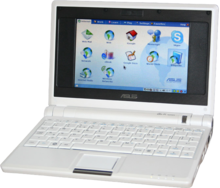Eee PC
 |
|
| Developer | ASUSTeK Computer Inc. |
|---|---|
| Type | Netbook |
| Operating system |
Linux (Xandros) Windows (XP, 7, 8.1) |
| CPU |
Intel (Celeron, Atom) AMD (AMD Fusion) |
| Website | www |
The Asus Eee PC is a netbook computer line from ASUSTeK Computer Incorporated, and a part of the Asus Eee product family. At the time of its introduction in late 2007, it was noted for its combination of a lightweight, Linux-based operating system, solid-state drive (SSD), and relatively low cost. Newer models added the options of Microsoft Windows operating system, rotating media hard disk drives (HDD) and initially retailed for up to 500 euros.
The first Eee PC was a milestone in the personal computer business, launching the netbook category of small, low cost laptops in the West (in Japan, subnotebooks had long been a staple in computing). According to Asus, the name Eee derives from "the three Es", an abbreviation of its advertising slogan for the device: "Easy to learn, Easy to work, Easy to play".
In January 2013, Asus officially ended production of their Eee PC series, citing declining sales due to consumers favoring tablets and Ultrabooks over netbooks. However, they subsequently restarted the line with the release of the EeeBook series in 2015.
Asus announced two Eee PC models at Computex Taipei 2007: the 701 and the 1001. The 701 base model Eee PC 4G was released on October 16, 2007 in Taiwan. Three additional models followed.
Both the price and the size of the device are small in comparison with similar Ultra-Mobile PCs. The Eee series is a response to the XO-1 notebook from the One Laptop per Child initiative. At the Intel Developer Forum 2007, Asus demonstrated the Classmate PC and the Eee PC, and listed specifications for four models of the Eee PC.
...
Wikipedia
